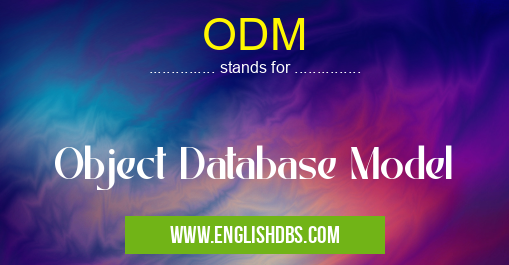What does ODM mean in DATABASES
ODM (Object Database Model) is a type of database model that is specifically designed to store and manage complex objects. Unlike traditional relational database models, which store data in tables and rows, ODM utilizes a more flexible approach that allows for the storage of objects with complex relationships and hierarchies.

ODM meaning in Databases in Computing
ODM mostly used in an acronym Databases in Category Computing that means Object Database Model
Shorthand: ODM,
Full Form: Object Database Model
For more information of "Object Database Model", see the section below.
Characteristics of ODM
- Object-Oriented: ODM adheres to the principles of object-oriented programming, enabling the representation of real-world objects and their relationships within the database.
- Inheritance Support: ODM supports inheritance, allowing the creation of new object classes that inherit the properties of existing classes.
- Polymorphism: ODM enables the storage and retrieval of objects of different types within a single database, providing flexibility in data management.
- Association Management: ODM provides powerful mechanisms for managing relationships between objects, such as one-to-many, many-to-many, and hierarchical relationships.
- Query Language: ODM utilizes a specialized query language that is tailored to the specific requirements of object-oriented data models.
Use Cases of ODM
ODM is particularly well-suited for applications that involve complex data structures, such as:
- Engineering Design: CAD/CAM systems that manage 3D models and their associated properties.
- Multimedia Management: Storage and retrieval of images, videos, and audio files with associated metadata.
- Social Networking: Management of user profiles, relationships, and content within social media platforms.
- e-Commerce: Representation of product catalogs, customer orders, and payment transactions.
Essential Questions and Answers on Object Database Model in "COMPUTING»DB"
What is an Object Database Model (ODM)?
An ODM is a data model that represents data as objects, rather than tables and rows as in relational databases. It is based on the object-oriented programming paradigm and offers the benefits of encapsulation, inheritance, and polymorphism.
What are the advantages of using an ODM?
ODMs provide several advantages, including:
- Object-oriented: They align with the object-oriented programming paradigm, making it easier to model complex data structures and relationships.
- Encapsulation: Objects encapsulate data and behavior, providing better control and security.
- Inheritance: Objects can inherit properties and methods from parent classes, reducing code duplication and improving maintainability.
- Polymorphism: Objects can respond differently to the same method call based on their type, enhancing flexibility and code reuse.
What are the disadvantages of using an ODM?
ODMs have some disadvantages as well:
- Performance: Compared to relational databases, ODMs can be less efficient for certain queries and data manipulations.
- Scalability: They may face scalability limitations for very large datasets, as objects tend to consume more storage space than relational data.
- Interoperability: ODMs may have limited interoperability with other systems that use different data models.
When should I use an ODM?
ODMs are suitable for applications where:
- Data has a complex and hierarchical structure.
- Encapsulation and object-oriented principles are important.
- Performance is not a critical concern.
- Interoperability with other systems is not a priority.
What are some popular ODM examples?
Popular ODM systems include:
- MongoDB
- CouchDB
- RavenDB
- MarkLogic
Final Words: ODM provides a powerful and flexible approach to managing complex data structures within databases. Its object-oriented design, inheritance support, and association management capabilities make it an ideal choice for applications that require the storage and retrieval of real-world objects with intricate relationships.
